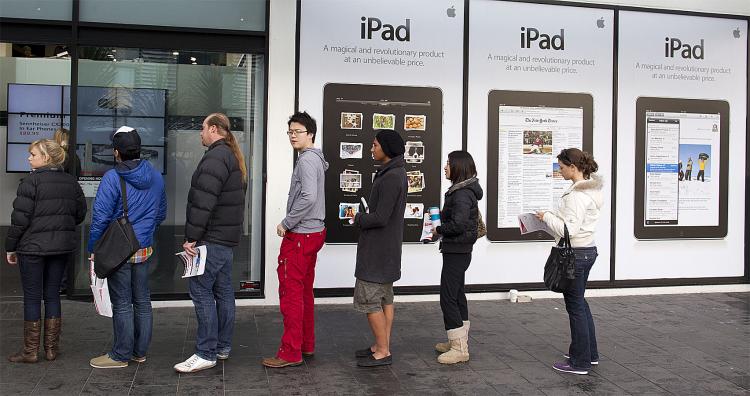NEWS ANALYSIS
NEW YORK—Apple Inc. sold 3 million copies of its iPad tablet computer in the first 80 days after it went on sale.
Running on the same operating system as the company’s iPhone and iPod Touch, the tablet computer runs apps, surfs the web, and can perform a host of multimedia features.
“Customers around the world are experiencing the magic of iPad and seem to be loving it as much as we do,” said Steve Jobs, Apple’s CEO, in a statement in May.
Apple’s success with the tablet computer is prompting its rivals—including Microsoft Corp. and Research In Motion Ltd.—to scramble to come up with their own versions of the tablet.
At its quarterly conference call with analysts, Microsoft CEO Steve Ballmer said, “Apple has done an interesting job of putting together a product—they’ve certainly sold more than I’d like them to sell.” Speaking of Microsoft’s own tablet—to be based on a mobile version of its Windows 7 operating system, “They'll be shipping as soon as they are ready,” Ballmer said. “It is job one urgency. No one is sleeping at the switch.”
But ironically, it was Microsoft that introduced to the world the original tablet PC in 2001.
Manufacturers such as Hewlett-Packard, Compaq, and Acer all shipped small laptops with removable keyboards and pen-enabled input, running a version of Windows called Windows XP Tablet PC Edition.
But somehow Microsoft was about ten years too early to the party—the infrastructure wasn’t yet in place to support a full experience on a tablet computer. Wi-Fi was still in its early stages, and there was no mobile network—3G speed wireless data transfer was still 7 years away—to fully take advantage of a mobile tablet computer. Sales flopped, and Microsoft killed the program in two years’ time.
Now, Ballmer is talking about a new Windows tablet. And one can’t help but notice that Ballmer may have iPad envy, seeing how Apple literally took away Microsoft’s rightful stake in the market, some ten years later.
At Microsoft’s second-quarter conference call, responding to a question from Sarah Friar of Goldman Sachs, Ballmer said, “And we are going to sell like crazy. We are going to market like crazy. We have devices that will run more applications, that have as much content, that have anything you want on the planet.”
NEW YORK—Apple Inc. sold 3 million copies of its iPad tablet computer in the first 80 days after it went on sale.
Running on the same operating system as the company’s iPhone and iPod Touch, the tablet computer runs apps, surfs the web, and can perform a host of multimedia features.
“Customers around the world are experiencing the magic of iPad and seem to be loving it as much as we do,” said Steve Jobs, Apple’s CEO, in a statement in May.
Apple’s success with the tablet computer is prompting its rivals—including Microsoft Corp. and Research In Motion Ltd.—to scramble to come up with their own versions of the tablet.
Reviving the Tablet PC
At its quarterly conference call with analysts, Microsoft CEO Steve Ballmer said, “Apple has done an interesting job of putting together a product—they’ve certainly sold more than I’d like them to sell.” Speaking of Microsoft’s own tablet—to be based on a mobile version of its Windows 7 operating system, “They'll be shipping as soon as they are ready,” Ballmer said. “It is job one urgency. No one is sleeping at the switch.”
But ironically, it was Microsoft that introduced to the world the original tablet PC in 2001.
Manufacturers such as Hewlett-Packard, Compaq, and Acer all shipped small laptops with removable keyboards and pen-enabled input, running a version of Windows called Windows XP Tablet PC Edition.
But somehow Microsoft was about ten years too early to the party—the infrastructure wasn’t yet in place to support a full experience on a tablet computer. Wi-Fi was still in its early stages, and there was no mobile network—3G speed wireless data transfer was still 7 years away—to fully take advantage of a mobile tablet computer. Sales flopped, and Microsoft killed the program in two years’ time.
Now, Ballmer is talking about a new Windows tablet. And one can’t help but notice that Ballmer may have iPad envy, seeing how Apple literally took away Microsoft’s rightful stake in the market, some ten years later.
At Microsoft’s second-quarter conference call, responding to a question from Sarah Friar of Goldman Sachs, Ballmer said, “And we are going to sell like crazy. We are going to market like crazy. We have devices that will run more applications, that have as much content, that have anything you want on the planet.”






